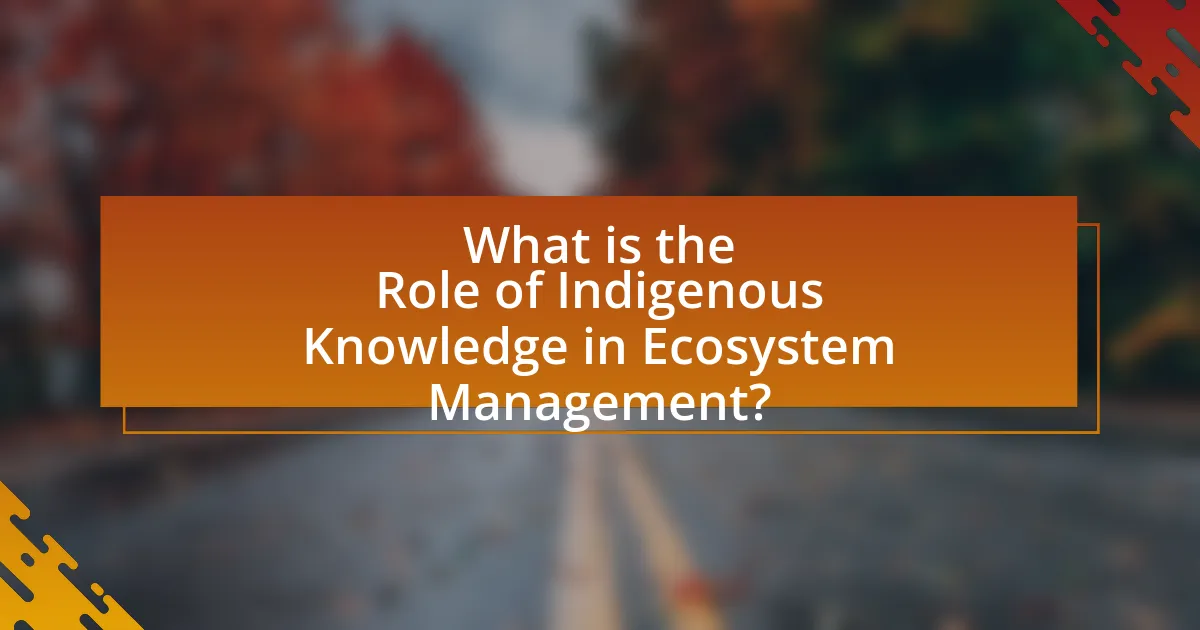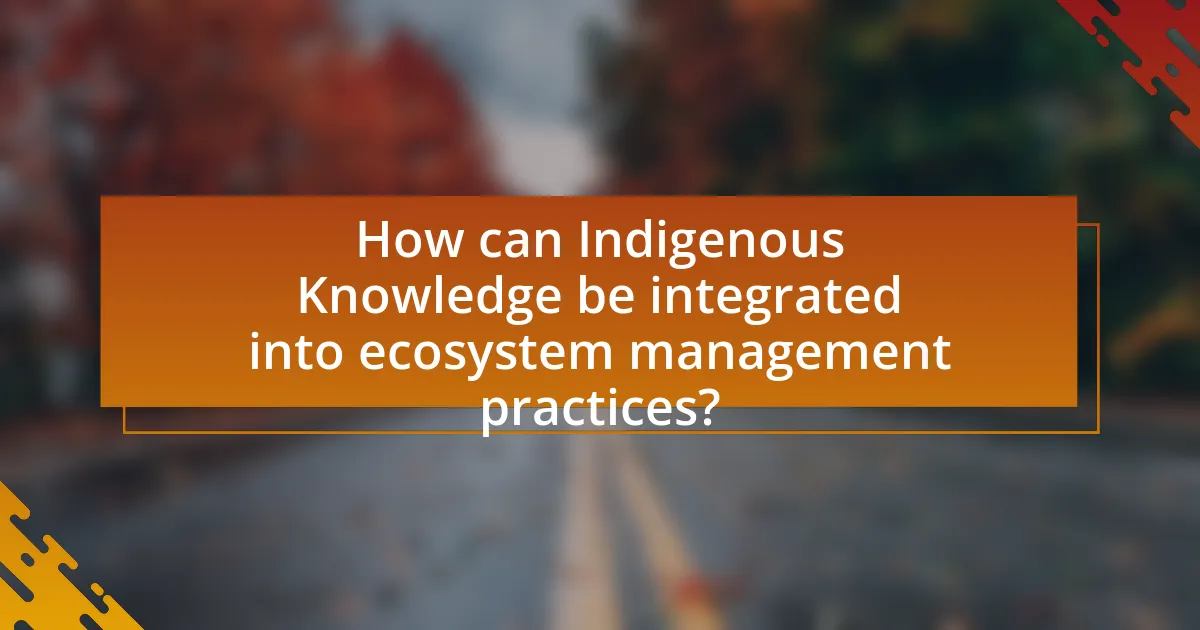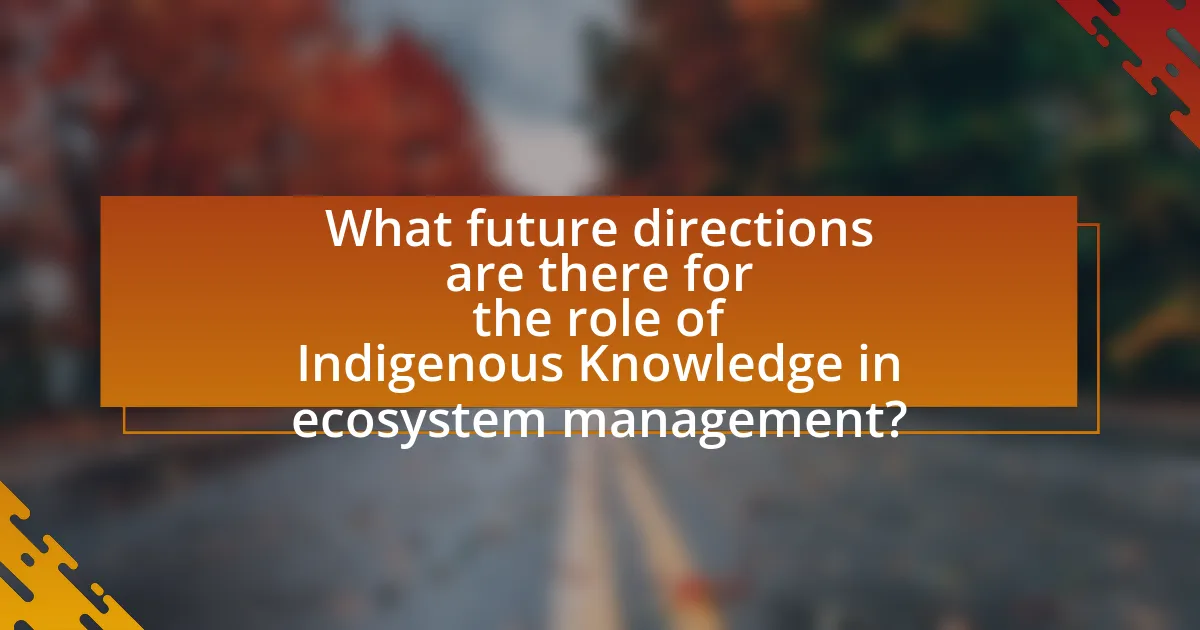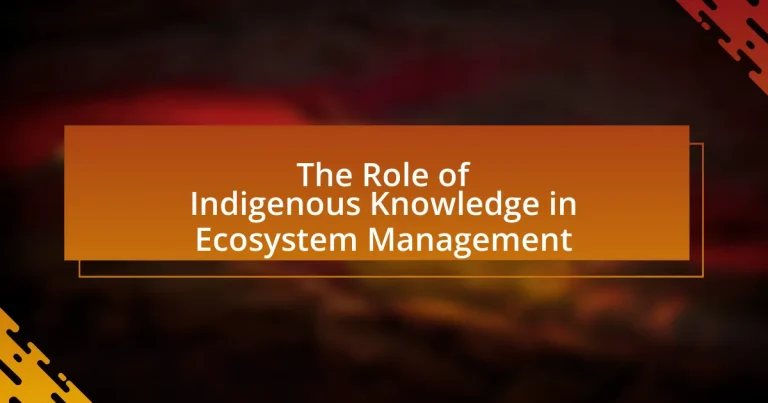The article focuses on the critical role of Indigenous Knowledge in ecosystem management, highlighting its significance in promoting sustainable practices developed over generations. It defines Indigenous Knowledge as a comprehensive body of traditional ecological understanding, resource management techniques, and cultural values that enhance biodiversity conservation. Key characteristics include its holistic approach, intergenerational transmission, and the differences between Indigenous and scientific knowledge systems. The article discusses the importance of integrating Indigenous Knowledge into contemporary management strategies, the challenges it faces, and successful case studies that illustrate its effectiveness in improving ecosystem resilience and biodiversity conservation. Additionally, it explores future directions for collaboration between Indigenous communities and scientific frameworks, emphasizing the need for policy support and innovative documentation methods.

What is the Role of Indigenous Knowledge in Ecosystem Management?
Indigenous knowledge plays a crucial role in ecosystem management by providing insights into sustainable practices that have been developed over generations. This knowledge encompasses traditional ecological understanding, resource management techniques, and cultural values that contribute to biodiversity conservation. For instance, Indigenous communities often utilize practices such as controlled burns to manage landscapes, which have been shown to enhance ecosystem resilience and reduce wildfire risks. Research indicates that integrating Indigenous knowledge with scientific approaches leads to more effective management strategies, as evidenced by case studies in North America where collaborative efforts have improved habitat restoration and species recovery.
How is Indigenous Knowledge defined in the context of ecosystem management?
Indigenous Knowledge in the context of ecosystem management is defined as the cumulative body of knowledge, practices, and beliefs developed by Indigenous peoples over generations, which is deeply rooted in their cultural and spiritual relationships with the land and natural resources. This knowledge encompasses sustainable practices for resource management, biodiversity conservation, and ecosystem health, often informed by traditional ecological wisdom and local environmental observations. For instance, studies have shown that Indigenous land management practices, such as controlled burning and seasonal harvesting, can enhance biodiversity and ecosystem resilience, demonstrating the effectiveness of Indigenous Knowledge in contemporary ecosystem management strategies.
What are the key characteristics of Indigenous Knowledge?
Indigenous Knowledge is characterized by its holistic understanding of ecosystems, deep-rooted cultural significance, and intergenerational transmission. This knowledge encompasses a comprehensive view of the environment, integrating spiritual, social, and ecological dimensions, which allows Indigenous communities to manage resources sustainably. For instance, Indigenous practices often include traditional ecological knowledge that has been developed over centuries, demonstrating effective land and resource management strategies that are adapted to local conditions. Additionally, this knowledge is typically passed down orally, ensuring that cultural values and practices are preserved and adapted through generations, which reinforces community identity and resilience.
How does Indigenous Knowledge differ from scientific knowledge?
Indigenous Knowledge differs from scientific knowledge primarily in its basis and methodology. Indigenous Knowledge is rooted in the cultural practices, traditions, and experiences of Indigenous peoples, often passed down through generations, emphasizing a holistic understanding of ecosystems. In contrast, scientific knowledge relies on empirical evidence, experimentation, and systematic observation, focusing on quantifiable data and reproducibility.
For example, Indigenous Knowledge may include traditional ecological practices that have been effective for centuries, such as controlled burns to manage landscapes, while scientific knowledge may analyze the same practices through controlled studies to understand their ecological impacts. This distinction highlights the complementary nature of both knowledge systems in ecosystem management, where Indigenous perspectives can provide insights that enhance scientific approaches.
Why is Indigenous Knowledge important for ecosystem management?
Indigenous Knowledge is important for ecosystem management because it encompasses a deep understanding of local ecosystems developed over generations. This knowledge includes traditional practices, species management, and sustainable resource use that have proven effective in maintaining biodiversity and ecological balance. For instance, studies have shown that Indigenous land management practices, such as controlled burns, enhance habitat diversity and reduce wildfire risks, as evidenced by research conducted by the Australian government, which highlights the effectiveness of Indigenous fire management in promoting ecological health. Thus, integrating Indigenous Knowledge into ecosystem management strategies can lead to more sustainable and resilient environmental practices.
What unique insights does Indigenous Knowledge provide about local ecosystems?
Indigenous Knowledge provides unique insights into local ecosystems by emphasizing the interconnectedness of species, seasonal changes, and sustainable resource management practices. This knowledge, accumulated over generations, includes detailed observations of animal behavior, plant growth cycles, and ecological relationships that are often overlooked by conventional scientific approaches. For instance, Indigenous communities have traditionally used fire management techniques to promote biodiversity and prevent larger wildfires, demonstrating an understanding of ecological balance that is supported by studies showing that such practices can enhance habitat diversity and resilience.
How does Indigenous Knowledge contribute to biodiversity conservation?
Indigenous Knowledge contributes to biodiversity conservation by integrating traditional ecological practices with sustainable resource management. This knowledge encompasses a deep understanding of local ecosystems, species interactions, and seasonal cycles, which has been developed over generations. For instance, Indigenous communities often employ practices such as controlled burns to manage landscapes, which can enhance habitat diversity and promote the growth of native species. Research indicates that areas managed by Indigenous peoples often exhibit higher biodiversity levels compared to those under conventional management, as seen in studies conducted in the Amazon rainforest, where Indigenous territories maintain greater forest cover and species richness.
What challenges does Indigenous Knowledge face in ecosystem management?
Indigenous Knowledge faces significant challenges in ecosystem management, primarily due to the lack of recognition and integration within formal scientific frameworks. This marginalization often leads to the undervaluation of traditional practices that have been effective for centuries in maintaining biodiversity and ecosystem health. For instance, a study by Berkes (2012) highlights that Indigenous Knowledge systems are frequently overlooked in policy-making processes, resulting in a disconnect between local practices and governmental regulations. Additionally, the impacts of climate change and land-use changes further threaten the transmission of Indigenous Knowledge, as younger generations may not have the opportunity to learn traditional ecological practices. These challenges hinder the effective collaboration between Indigenous communities and environmental management agencies, ultimately affecting the sustainability of ecosystems.
How do modern practices conflict with Indigenous Knowledge?
Modern practices often conflict with Indigenous Knowledge by prioritizing industrial methods over traditional ecological practices. For instance, contemporary agricultural techniques frequently emphasize monoculture and chemical inputs, which can degrade soil health and biodiversity, contrary to Indigenous practices that promote polyculture and sustainable land stewardship. Research indicates that Indigenous land management techniques, such as controlled burns, enhance ecosystem resilience, yet these methods are often overlooked in favor of modern practices that may lead to habitat destruction and loss of biodiversity. This disconnect can result in the erosion of Indigenous cultural practices and knowledge systems, as seen in various regions where land is appropriated for industrial development, undermining the holistic understanding of ecosystems that Indigenous peoples possess.
What barriers exist in integrating Indigenous Knowledge into formal management systems?
Barriers to integrating Indigenous Knowledge into formal management systems include systemic biases, lack of recognition, and differing worldviews. Systemic biases often manifest in the prioritization of Western scientific methods over Indigenous practices, leading to marginalization of Indigenous perspectives. Additionally, formal management systems frequently do not recognize Indigenous Knowledge as valid or credible, which undermines its incorporation into decision-making processes. Furthermore, the differing worldviews between Indigenous communities, which often emphasize holistic and relational approaches to nature, and formal management systems, which may focus on quantitative data and linear outcomes, create fundamental challenges in collaboration. These barriers hinder effective integration and utilization of Indigenous Knowledge in ecosystem management.

How can Indigenous Knowledge be integrated into ecosystem management practices?
Indigenous Knowledge can be integrated into ecosystem management practices by incorporating traditional ecological knowledge (TEK) into decision-making processes. TEK provides insights into local biodiversity, sustainable resource use, and ecosystem dynamics, which can enhance contemporary management strategies. For instance, studies have shown that Indigenous land management practices, such as controlled burns, have effectively reduced wildfire risks and improved habitat conditions in various regions, including Australia and North America. This integration fosters collaboration between Indigenous communities and environmental agencies, ensuring that management practices are culturally relevant and ecologically sound.
What are effective methods for incorporating Indigenous Knowledge?
Effective methods for incorporating Indigenous Knowledge include collaborative partnerships between Indigenous communities and researchers, integrating traditional ecological knowledge into scientific frameworks, and utilizing community-led initiatives for resource management. Collaborative partnerships ensure that Indigenous voices are heard and respected, fostering mutual learning and respect. For instance, the integration of traditional ecological knowledge has been shown to enhance biodiversity conservation efforts, as evidenced by case studies in Canada where Indigenous practices have led to improved ecosystem health. Community-led initiatives empower Indigenous peoples to manage their resources sustainably, as demonstrated by the successful implementation of Indigenous Protected and Conserved Areas, which have been recognized for their effectiveness in preserving biodiversity and cultural heritage.
How can collaboration between Indigenous communities and scientists be fostered?
Collaboration between Indigenous communities and scientists can be fostered through mutual respect, shared goals, and inclusive dialogue. Establishing partnerships that recognize Indigenous knowledge as valuable and complementary to scientific methods enhances ecosystem management. For instance, the United Nations Declaration on the Rights of Indigenous Peoples emphasizes the importance of Indigenous participation in decision-making processes, which can lead to more effective conservation strategies. Additionally, case studies, such as the collaboration between the Kuku Yalanji people and scientists in Australia, demonstrate that integrating traditional ecological knowledge with scientific research results in improved biodiversity outcomes.
What role do policy frameworks play in supporting Indigenous Knowledge integration?
Policy frameworks play a crucial role in supporting Indigenous Knowledge integration by providing structured guidelines that facilitate collaboration between Indigenous communities and governmental or institutional bodies. These frameworks establish legal recognition and protection for Indigenous Knowledge, ensuring that it is respected and utilized in decision-making processes related to ecosystem management. For instance, the United Nations Declaration on the Rights of Indigenous Peoples emphasizes the importance of Indigenous participation in environmental governance, which reinforces the integration of traditional ecological knowledge into contemporary practices. Such policies not only validate Indigenous perspectives but also enhance the effectiveness of ecosystem management by incorporating diverse knowledge systems that have been developed over generations.
What case studies illustrate successful integration of Indigenous Knowledge?
Case studies illustrating successful integration of Indigenous Knowledge include the collaborative management of the Great Bear Rainforest in British Columbia, Canada, and the use of traditional ecological knowledge in the restoration of the San Francisco Bay-Delta ecosystem. In the Great Bear Rainforest, Indigenous communities partnered with environmental organizations and the provincial government to protect and manage the forest, incorporating traditional practices and knowledge into conservation strategies. This collaboration resulted in enhanced biodiversity and sustainable resource management. Similarly, in the San Francisco Bay-Delta, Indigenous knowledge has been integrated into habitat restoration projects, leading to improved ecological outcomes and community engagement. These examples demonstrate the effectiveness of combining Indigenous Knowledge with scientific approaches in ecosystem management.
What lessons can be learned from specific examples of Indigenous-led ecosystem management?
Indigenous-led ecosystem management demonstrates the effectiveness of integrating traditional ecological knowledge with contemporary conservation practices. For instance, the use of controlled burns by Indigenous communities in Australia has been shown to reduce wildfire risks and promote biodiversity, as evidenced by the successful management of landscapes that have thrived under these practices for thousands of years. Additionally, the Haida Nation’s management of marine resources in British Columbia highlights the importance of sustainable fishing practices that respect ecological balance, leading to healthier fish populations and ecosystems. These examples illustrate that Indigenous knowledge systems can provide valuable insights into sustainable resource management, emphasizing the need for collaboration between Indigenous peoples and governmental agencies to enhance ecological resilience.
How have Indigenous practices improved ecosystem resilience in various regions?
Indigenous practices have significantly improved ecosystem resilience by promoting biodiversity, sustainable land management, and adaptive resource use. For instance, in the Amazon rainforest, Indigenous communities utilize traditional agroforestry techniques that enhance soil fertility and increase species diversity, leading to more resilient ecosystems. Research by the United Nations Food and Agriculture Organization highlights that these practices can restore degraded lands and improve carbon sequestration, which is crucial for climate resilience. Additionally, in Australia, Indigenous fire management practices, such as controlled burns, have been shown to reduce the risk of catastrophic wildfires and maintain healthy ecosystems, as documented in studies by the Australian Institute of Aboriginal and Torres Strait Islander Studies. These examples illustrate how Indigenous knowledge contributes to ecosystem resilience across various regions.

What future directions are there for the role of Indigenous Knowledge in ecosystem management?
Future directions for the role of Indigenous Knowledge in ecosystem management include integrating traditional ecological knowledge with scientific approaches to enhance biodiversity conservation and climate resilience. Collaborative frameworks that involve Indigenous communities in decision-making processes are essential, as evidenced by successful case studies like the co-management of marine resources in Australia, which have shown improved ecological outcomes. Additionally, there is a growing recognition of the importance of Indigenous practices in land stewardship, which can inform sustainable agriculture and forestry practices, as highlighted by research from the United Nations Permanent Forum on Indigenous Issues. This integration not only respects Indigenous rights but also leverages their deep understanding of local ecosystems, ultimately leading to more effective management strategies.
How can technology support the preservation and application of Indigenous Knowledge?
Technology can support the preservation and application of Indigenous Knowledge by providing digital platforms for documentation, sharing, and collaboration. For instance, mobile applications and online databases enable Indigenous communities to record traditional practices, languages, and ecological knowledge, ensuring that this information is accessible to future generations. Research conducted by the United Nations Educational, Scientific and Cultural Organization (UNESCO) highlights that digital storytelling and multimedia tools can enhance the visibility of Indigenous narratives, fostering cultural pride and awareness. Additionally, Geographic Information Systems (GIS) allow for the integration of Indigenous ecological knowledge with scientific data, facilitating informed decision-making in ecosystem management. This synergy between technology and Indigenous Knowledge not only preserves cultural heritage but also enhances environmental stewardship.
What innovative approaches are being developed to document Indigenous Knowledge?
Innovative approaches being developed to document Indigenous Knowledge include the use of digital storytelling, participatory mapping, and collaborative research methodologies. Digital storytelling allows Indigenous communities to share their narratives and traditional practices through multimedia platforms, preserving their knowledge in accessible formats. Participatory mapping engages community members in documenting their land use and cultural practices, creating visual representations that reflect their relationship with the environment. Collaborative research methodologies emphasize partnerships between Indigenous peoples and researchers, ensuring that Indigenous perspectives are integrated into scientific studies. These approaches are validated by various initiatives, such as the Indigenous Mapping Workshop, which promotes the use of technology to empower Indigenous communities in documenting their knowledge and land rights.
How can education systems incorporate Indigenous perspectives on ecosystem management?
Education systems can incorporate Indigenous perspectives on ecosystem management by integrating Indigenous knowledge into curricula and fostering partnerships with Indigenous communities. This approach acknowledges the historical and cultural significance of Indigenous practices in managing ecosystems, which often emphasize sustainability and holistic understanding of natural resources. For instance, research shows that Indigenous land management techniques, such as controlled burns, have been effective in preventing wildfires and promoting biodiversity. By including these practices in educational programs, students can learn about the value of traditional ecological knowledge alongside scientific methods, thus enriching their understanding of ecosystem management.
What best practices should be followed for effective ecosystem management using Indigenous Knowledge?
Effective ecosystem management using Indigenous Knowledge should prioritize collaboration with Indigenous communities, integrating their traditional ecological practices and perspectives into management strategies. This approach recognizes the deep understanding Indigenous peoples have of local ecosystems, often developed over thousands of years. For instance, the use of controlled burns by Indigenous groups in North America has been shown to enhance biodiversity and reduce wildfire risks, as documented in studies like “Cultural Burning: A Key to Ecological Restoration” by the University of California. Additionally, respecting Indigenous land rights and governance structures fosters trust and ensures that management practices are culturally relevant and sustainable. Engaging in co-management agreements can also lead to more effective conservation outcomes, as seen in various successful partnerships across Canada and Australia.
How can stakeholders ensure respect and recognition of Indigenous Knowledge in management practices?
Stakeholders can ensure respect and recognition of Indigenous Knowledge in management practices by actively engaging Indigenous communities in decision-making processes. This engagement includes incorporating Indigenous perspectives, practices, and values into management frameworks, which has been shown to enhance biodiversity conservation and ecosystem resilience. For instance, studies indicate that Indigenous land management practices, such as controlled burns, have effectively maintained healthy ecosystems for centuries. By recognizing the validity and importance of Indigenous Knowledge, stakeholders can create collaborative management strategies that honor traditional ecological wisdom while achieving sustainable outcomes.
What strategies can be employed to promote the sustainability of Indigenous Knowledge systems?
To promote the sustainability of Indigenous Knowledge systems, integrating these systems into formal education and policy frameworks is essential. This approach ensures that Indigenous perspectives are recognized and valued in decision-making processes, thereby enhancing their relevance and application in contemporary environmental management. For instance, the United Nations Declaration on the Rights of Indigenous Peoples emphasizes the importance of Indigenous knowledge in biodiversity conservation, highlighting its role in sustainable practices. Additionally, fostering partnerships between Indigenous communities and academic institutions can facilitate knowledge exchange and capacity building, further supporting the preservation and application of Indigenous Knowledge in ecosystem management.


